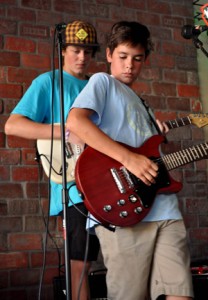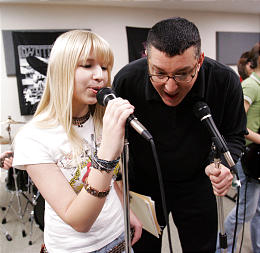 The drumsticks tap—one, two three, four—and the song explodes with some serious rock ‘n’ roll force. Guitarists Andrew Cleveland and Emma Roberts strike the hard-driving opening chords of The Edgar Winter Group’s “Frankenstein,” accompanied by bassist Sierra Gentry and backed up by tireless drummer T.J. Maddux. Just another rock ‘n’ roll night at Mo’s Neighborhood Grill? Well, yes and no. The equipment set-up is professional and the audience clearly appreciates rock music, but what’s unique about this evening’s show is that the performers cranking out Led Zeppelin, Van Halen and Pink Floyd range in age from 11 to 18 and are on stage because performing live is part of the legitimate rock band experience offered by the Music Garage youth program, a program that puts these minority players on stage also at venues like the Deer Valley Amphitheater and events such as the Salt Lake Arts Festival, Desert Rocks in Moab and, this past August, at the Uncle Uncanny’s Music Fest in Heber.
The drumsticks tap—one, two three, four—and the song explodes with some serious rock ‘n’ roll force. Guitarists Andrew Cleveland and Emma Roberts strike the hard-driving opening chords of The Edgar Winter Group’s “Frankenstein,” accompanied by bassist Sierra Gentry and backed up by tireless drummer T.J. Maddux. Just another rock ‘n’ roll night at Mo’s Neighborhood Grill? Well, yes and no. The equipment set-up is professional and the audience clearly appreciates rock music, but what’s unique about this evening’s show is that the performers cranking out Led Zeppelin, Van Halen and Pink Floyd range in age from 11 to 18 and are on stage because performing live is part of the legitimate rock band experience offered by the Music Garage youth program, a program that puts these minority players on stage also at venues like the Deer Valley Amphitheater and events such as the Salt Lake Arts Festival, Desert Rocks in Moab and, this past August, at the Uncle Uncanny’s Music Fest in Heber.
The brainchild of seasoned industry talent and founder Steve Auerbach, Music Garage gives young people the opportunity to learn how to be a member in a working rock band. The youth program is the stronghold component of the two-year old expanding organization, the scope of which is to provide rehearsal and performance services for both the youngsters and the oldsters of the community. The long-term big picture of Music Garage is to provide a place for adults and kids to meet and perform with other musicians. “My job,” Auerbach says, “is to keep music in people’s lives.”
Working with young people makes Steve and music coaches Allison Martin and Chris Stevenson de facto educators. Core values are clearly defined to include not only musicianship, but also self-reliance, self-determination, respect, humility and service to the band, and selflessness. “We want the kids to ‘get’ on their own that they need to practice. Life’s about the group. It’s about respect, and it’s about learning someone else’s song, even if it’s not your style. They have two hours a week to honor the gods of rock,” Steve says earnestly, “and I want them to treat Music Garage like it’s sacred ground.”
Self-reliance is immediately enacted as musicians are encouraged to bring to the 11-week sessions songs that they want to play and must then help their band members learn. Participants must already know how to play, though being able to read music is not a prerequisite. “The presumption upon enrollment,” Auerbach explains, “is that they can play at an intermediate to advanced level and can play in meter. Some learn by ear, some by music and some by tablature, but we don’t dictate how they need to learn their part.”
The program features frequent session visits by (often famous) guest clinicians who offer high caliber performance instruction, but in designing the program Steve made a conscious choice not to include music instruction so that the niche Music Garage fills does not take away from the community’s private teachers. Music Garage then is an ideal segue for young people who already know and are learning new songs and want other music devotees to play with, and devoted they are. Andrew Cleveland remembers the day he first heard Van Halen on a Wednesday in 2010. “Before, I was obsessed with video games. Now I’m obsessed with music,” says the 13-year old who debuted his previously unknown singing skills at Mo’s by taking on, working and successfully riding out Led Zeppelin’s “Whole Lotta Love.”
If you love music, playing and performing, you should enjoy being in a band. 16-year old bassist Sierra Gentry says she had anticipated that “it would feel more like work, but it’s been more fun than I thought.” And though fun characterizes the experience of her band mates, the rigors of practice-makes-perfect prompts most participants to assess that being in the band is “a lot of work.” Comparing Music Garage to another program, 11-year old Tatum Gillette notes that “this one’s harder.” Senior band member Dylan Proesch, 18, recognizes that the commitment to regular school and to band are similar in that “you have classwork and homework, but if you don’t do your homework here, it’s definitely noticed!”
By the sound coming out of the speakers though it’s obvious that every musician has done the homework for this live performance test. The music rolls and rocks, the audience is digging it and clearly, by the smile on drummer T.J.’s face as he steps off the stage he knows that he’s just nailed those complex Frankenstein beats.


